Why Do I Have Squeaky Brakes, Even Though The Pads are New?
We had a new client come in this week because her brakes were squeaking. She just had new pads and rotors installed about 6 months ago, and she was a bit frustrated and concerned about what was happening.
Unfortunately, brake noise and dust is not all that unusual, even when it’s so soon after a brake service. There are any number of reasons your brakes can squeal, squeak, groan or even generate lots of dust.
Here are the main causes assuming your brake pads and rotors are newer and are not worn:
Cheap Brake Pads
Like most things, you get what you pay for. There are low quality, standard quality and premium quality brake pads on the market. If an auto shop puts cheap brake pads on your car to save you a few bucks, you may come to regret it in short order. It’s very common for cheap brake pads to make noise and to create a lot of dust.
Rotor Issues
Again, in the interest of saving money, some auto shops and consumers skip the important step of machining the rotors when replacing brake pads. Or they may attempt to machine them when they really need to be replaced. If new brake pads are put on the car with old rotors that are not machined, the rotor won’t have a surface that meshes with the new pads. This can lead to brake noise, and in some cases, vibrations or pulsations. Similarly, if the rotors are machined but are too thin (below specification), they can warp from the heat generated when you brake. This will cause a brake pulsation.
Repeated Hard Stops
If you survive your daily commute by pretending you’re a race car driver, you may also find that you start—and stop—quickly. When you panic stop or slam on the brakes, it generates heat. Too much of this can create a glossy or glazed finish on the brake pad, which can lead to brake noise.
When Should You Take the Car In?
It’s difficult to know what’s causing brake noise or vibration without inspecting your brakes and rotors. We recommend playing it safe and having your brakes inspected by a professional mechanic. Don’t hesitate to give us a call at 847-251-0300 or to schedule an appointment so we can help put your mind at ease.
Fortunately, in the case of our client, we determined that there were metal fibers on the brake pads which were close together. This is not all that uncommon because of the way brake pads are made. Had she continued to drive, the pads would likely have worn past that point, and the noise would have diminished or gone away altogether.
In her case, we were able to warranty the brake pads from the manufacturer, machine her rotors and get her back on the road.

